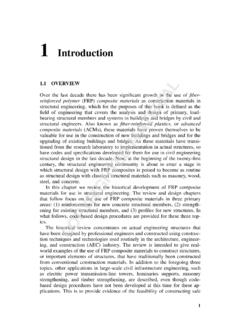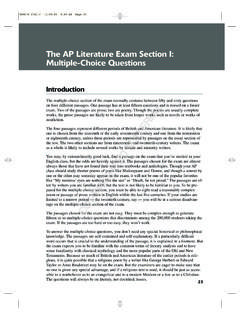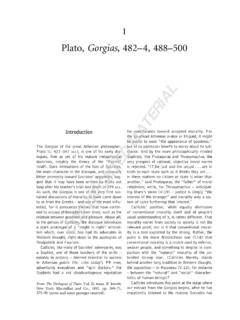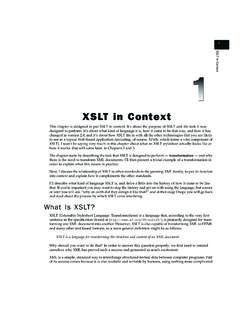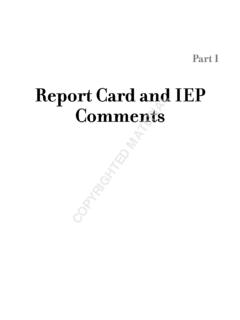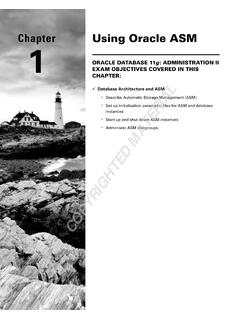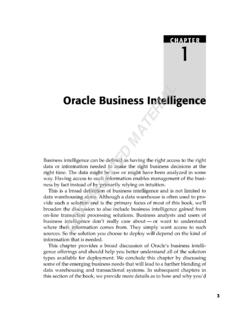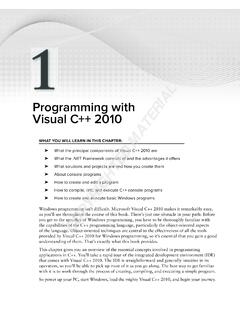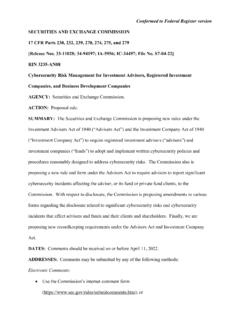Transcription of Corporate governance: frameworks and mechanisms
1 Part ICorporate governance : frameworks and mechanisms 1/12/10 10:47 AM Page 1 COPYRIGHTED 1/12/10 10:47 AM Page 2 Chapter 1 Defining Corporate GovernanceAims and ObjectivesThis chapter provides an introduction to the Corporate governance discipline, predominantly froma UK perspective. The specific objectives of this chapter are to: discuss a range of definitions of Corporate governance in order to arrive at a definition that isappropriate for this text, appreciating the dynamic nature of the subject; appreciate the development of Corporate governance from a historical perspective; compare and contrast several theoretical frameworks that are applied to the Corporate gover-nance discipline.
2 Demonstrate the growing importance of a stakeholder-oriented approach to Corporate governance ; consider the frontiers of academic research in Corporate Corporate governance has become one of the most commonly used phrases in the current global busi-ness vocabulary. The global financial crisis and credit crunch which have engulfed financial markets andeconomies around the world, causing bank failures and resulting in a recession in the UK and else-where, have further catapulted Corporate governance onto centre stage.
3 Increasingly, weaknesses incorporate governance are being held up as reasons for and causes of the current crisis. Excessive execu-tive remuneration, failures in risk management and internal control systems, weak monitoring, lack ofindependence in the boardroom and a distinct dearth of boardroom ethics are being blamed for the liq-uidity crisis and its repercussions. There is a public outcry at the way in which bankers have taken riskswhich have led to the crisis, at the same time receiving massive salaries and bonuses, with calls 1/12/10 10:47 AM Page 3greater accountability from the banking sector.
4 The notorious collapse of Enron in 2001, one ofAmerica s largest companies, focused international attention on company failures and the role thatstrong Corporate governance needs to play to prevent them. Similarly, Corporate crises such as Parmalathave shown that Corporate governance weaknesses in different economies around the world can lead tosimilar problems. The UK responded to Enron by producing the Higgs Report (2003) and the SmithReport (2003), whereas the US produced the Sarbanes Oxley Act (2002).
5 However, the effectivenessof these principles and codes of Corporate governance best practice may be called into question in thelight of recent the UK and the USA responded sharply and effectively to the failure of Enron, bystrengthening the Corporate governance framework, something seems to be missing from their policy-makers focused on strengthening systems of internal control (internal audit, auditcommittees and the role of non-executive directors, for example), the current crisis is riddled withcorporate governance failures emanating from poor risk management, inadequate internal controlsand weak monitoring of boards.
6 What has gone wrong? frameworks for good Corporate governanceare embedded in the UK, the USA and elsewhere around the world, but for some reason these frame-works have not delivered protection to major banks and other significant organizations. The linksbetween weak Corporate governance and Corporate collapse are now being made for the first time inrelation to the current crisis. Corporate governance problems were identified as primary causes forprevious Corporate failures. So why were lessons not learned?
7 Why did banks and other organizationsrepeat earlier mistakes, when they were so well-publicized? This is a mystery for academics and policy-makers alike, and remains a question requiring debate, even when this book has explored around the world have instigated far-reaching programmes for Corporate governance reformfor some years now, as evidenced by the proliferation of Corporate governance codes and policy docu-ments, voluntary or mandatory, both at the national and supra-national level.
8 See Figure in Chapter 7for an illustration of how Corporate governance best practice is being diffused around the world throughthe gradual development of codes of practice in a profusion of countries. In my view the present focus oncorporate governance will be maintained into the future and over time, especially given recent events. Thephenomenal growth of interest in Corporate governance has been accompanied by a growing body of aca-demic research. As the discipline matures, far greater definition and clarity are being achieved concerningthe nature of Corporate governance .
9 Furthermore, as the discipline matures both in terms of academicresearch and in terms of policy-making and codes of practice, the definition of Corporate governance isevolving rapidly. As we shall see throughout this chapter, Corporate governance is a dynamic conceptwhich has grown and transformed in many varied ways over the last 15 years. It is likely that corporategovernance will continue to evolve in the future both passively, in response to events, but also actively, asacademics and practitioners seek to improve continuously the accountability of organizations to stake-holders and to society as a of the most significant developments in Corporate governance has been its increasingly inclusivenature, with stakeholder concerns being of growing importance to companies worldwide.
10 For instance,the ever-worsening climate change crisis is becoming a crucial aspect of companies strategic decision-making and risk management systems. Some may suggest that financial aspects of Corporate governance4 CORPORATEGOVERNANCE: frameworks 1/12/10 10:47 AM Page 4need to be addressed before issues such as climate change. However, it is not possible for the corporatecommunity and policy-makers to focus exclusively on the financial crisis: the climate crisis is happeningat the same time and cannot be pushed to one side while financial issues are addressed.
